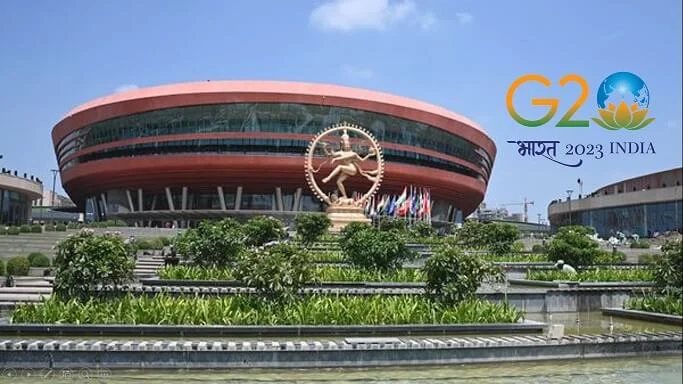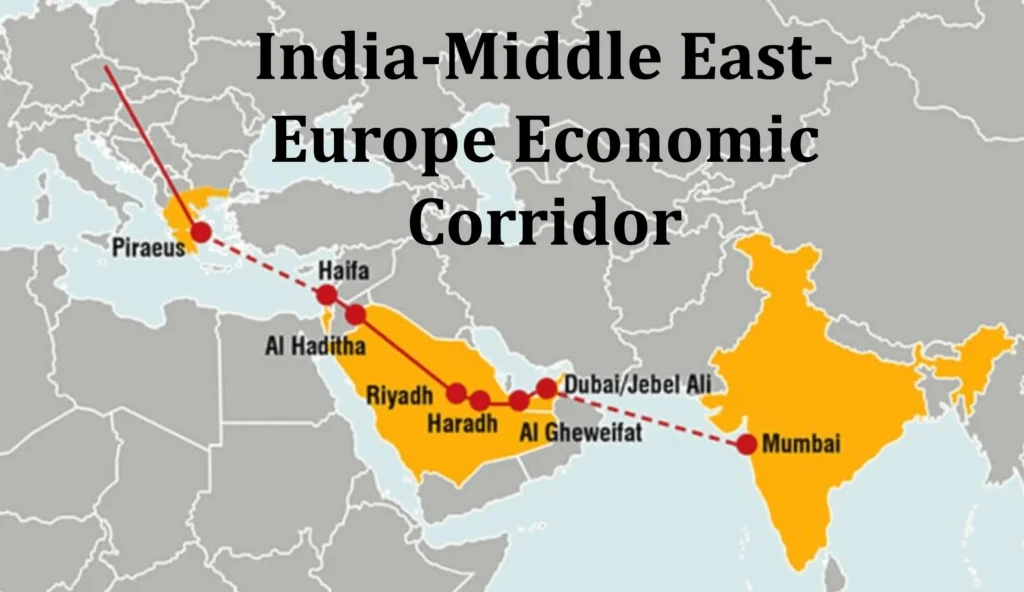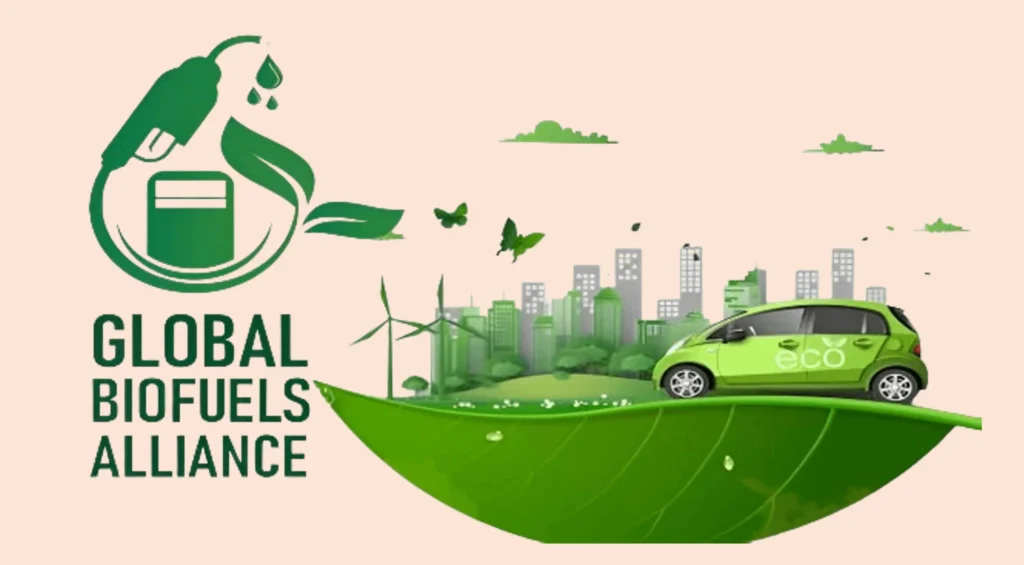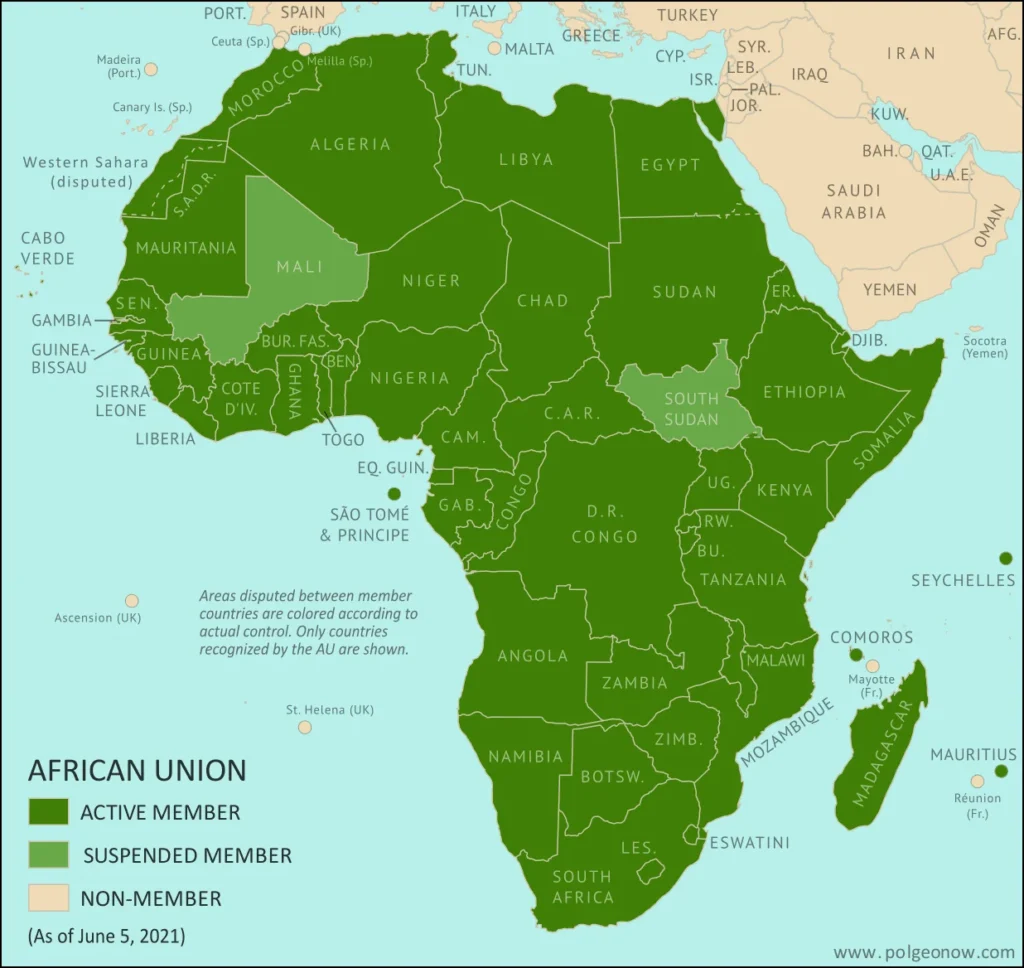
The 18th G20 Summit in 2023, hosted in India under its presidency, marked a pivotal moment in global diplomacy and geopolitics. The summit came to an end with the ratification of the New Delhi Declaration. Since it was supported by every participating nation it became an historic achievement. Given the agreement struck on the Ukraine Crisis by both Russia and China. This unprecedented effort to forge a consensus was of great significance. A number of new international projects were launched at the summit. They promise to change the geopolitical and geo-economic face of the world. Earlier in my blog post on G20, I tried to inform all my readers about the significance, history and achievements of this forum. Today, I’ll try to cover the key G20 Summit 2023 conclusions carefully and critically in this blog post, with a focus on its geopolitical and geo-economic import.
G20 SUMMIT 2023 OUTCOMES
Launch of India-Middle East-Europe Corridor (IMEC)
Geo-Political Significance of IMEC
The India-Middle East-Europe Corridor, known as IMEC, is a big project to build new roads and shipping routes. The IMEC project is divided into two primary components. The Middle East is connected to Europe in the north by one section. The other connects India to the Middle East in the east. Countries like Jordan, India, Israel, Saudi Arabia, the United Arab Emirates, France, Germany and Italy are directly linked to the project. Whereas United States is indirectly associated with it.

Together these nations have pledged to develop this route to connect two different worlds. Better transportation is simply one of the goals of IMEC. IMEC also aims to bring peace and stability in the Middle East region with the talks initiated by Israel and Saudi Arabia. As a consequence, the place can become more peaceful and stable.
The ability to counter China’s global influence is another significant aspect of IMEC. China has been funding nations with large-scale projects under the Belt and Road Initiative (BRI) for a long time. Some people say these projects put countries in big debt and make expensive things that don’t help much.So, IMEC is like a different way to build things, where countries work together and try to make the world a better place to live.
Geo-Economic Significance of IMEC
IMEC has been launched with the aim to benefits its member nations as it promises to improve the flow of energy and upgrade the digital communications. The middle-income and low-income nations are separated by a huge infrastructural gap. With this project G20 nations will try to bring these two sections closer. Furthermore, it also aims to advance technology without disturbing the ecological balance. Additionally, with the construction of rail, roads and improvement of shipping routes the trade and transport among this nation will improve. Consequently, it will bring prosperity to these nations.
The project’s implementation on the ground, obtaining the required money in the face of a worldwide economic downturn, and potential opposition from China—which has extensively invested in the BRI and the economies of the Middle East—are the hurdles.
Launch of Global Biofuel Alliance (GBA)
India, Brazil and the United States collectively initiated “The Global Biofuel Alliance (GBA)”. It is a significant step toward sustainable energy. Moreover, it will produce 85% of the ethanol produced worldwide. It focuses on:
- Increased Technology Transfers: GBA facilitates the transfer of technologies and mobilization of international climate funds, accelerating advancements in compressed biogas and third-generation ethanol production capacities.
- Achieving Higher Blending: Countries can learn from successful examples like Brazil, where E-85, an 85% blend of biofuel with petrol, has been achieved. GBA encourages the adoption of such technologies worldwide.
- Combatting Climate Change: Meeting the International Energy Agency’s (IEA) target to triple global biofuel production by 2030 is essential for achieving net-zero emissions by 2030. GBA’s focus on biofuels contributes to reducing global warming.
- Decarbonization of Transportation: Blending petrol with ethanol, using biodiesel, and Sustainable Aviation Fuel (SAF) all contribute to reducing greenhouse gas emissions in the transportation sector. GBA promotes decarbonization.
- Reduced Dependence on OPEC and OPEC+: Increased biofuel usage in blending reduces reliance on fossil fuels, diminishing countries’ dependence on the policies of organizations like OPEC and OPEC+.

Also Read: Embracing Cleaner Energy: World Biofuel Day
However, GBA faces challenges, including the reluctance of the United States to share technology, geopolitical contestation from China and Russia, import restrictions on biofuels in certain countries, and the need for structured funding mechanisms.
Climate Change: Back bencher in the Summit
While the G20 leaders agreed to triple global renewable energy capacity by 2030 and phase down unabated coal power, they did not provide a concrete plan or financial pathway to achieve these goals. To give importance to the agenda on Environment, Indian Government imported 17 saplings from the member nations which were to be planted by the world leaders during the summit. The annual investment needed for a green energy transition is approximately $4 trillion which is a challenge in itself.
Emergence of One Future Alliance
The One Future Alliance is a voluntary initiative. It aims at building capacity, providing technical assistance. It also aims at securing funding support for implementing digital public infrastructure in low- and middle-income countries. Global Digital Public Infrastructure Repository has been created to assist this program. It lays emphasis on:
- Economic Development of Global South: Digital Public Infrastructure (DPI) can serve as a powerful mechanism for financial inclusion in global southern economies.
- India’s Leadership: Successful adoption of Indian UPI positions it as a leader in digital public infrastructure. It also boosts fintech, entrepreneurship and businesses in the global south.
- Enhanced Productivity: Adoption of DPI increases productivity in global south economies, reducing the Incremental Capital Output Ratio (ICOR).
Like any other alliance and groups, One Future Alliance too has some challenges. They are:
- Need for Investment: Creating digital public infrastructure demands substantial investments, which may be challenging for global economies to finance independently. This opens the door for potential debt trap diplomacy by colonizing powers like China.
- Data Protection Laws: The wealth of data generated by Digital Public Infrastructure is attractive to multinational corporations. Global south countries need robust data protection laws to safeguard against “tech colonization.”
African Union (AU): Now a Permanent G20 Member
Geo-Political Significance of AU
Representing G20 on the world stage was the goal behind the decision to admit the African Union (AU). African Union has 55 member nations, as a permanent member. In the G20, which had long been controlled by G7 nations, this action put the AU on an equal footing with the European Union (EU). Further, it gives the Global South a stronger voice.

Additionally, with India strongly supporting the inclusion of African Union in G20 has brought back the intensity in the relation between India and Africa. Moreover, it has brought forwards India as a leader of South at the global stage. Now, it is up to the Government of India how they capitalize this opportunity and strengthen their ties with African Nations.
Impact of AU on Global Economics
The inclusion of the African Union (AU) in the G20 aimed to address economic imbalances in the group’s representation. Africa is getting ready to be the next big place for global growth. Moreover, having the African Union (AU) as part of the G20 makes it more representative.
Africa’s vast natural resources, including cobalt in the DR Congo. The world’s largest phosphate reserve in Morocco and Nigerian gas capable of powering all of Europe. It must be harnessed judiciously to fuel next-generation climate-friendly technologies such as e-batteries and e-vehicles.
However, difficulties in obtaining agreement within the larger G20 and worries about China’s influence via AU representation might offer problems.
Conclusion
The 18th G20 Summit in 2023 has showcased India’s influence as both an influential diplomatic and economic power. The decisions taken in this summit collectively will impact several aspects of global relations. It is to see that how the nations represent themselves globally after this summit. Moreover, the reaction of Xi Jinping President of China, who was absent in the summit is yet to come. Reaction of the oil producing countries on the decision of developing sustainable energy technologies will be crucial. Cooperation of the countries on constructing infrastructure like roads and bridges will decide the future of IMEC. The impact on the Indo- Russia Relation due to the growing closeness with India and America is yet to be observed.
Even if there are still challenges to face, the G20 Summit has made a lasting impression on history. In order to guarantee a just and sustainable future, India has been crucial. India has a whole year to bring in investments and trade. Finally, this is boosting India’s importance on the world stage, all thanks to its leadership in the G20.
